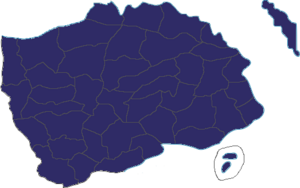Alscian general election, 1908: Difference between revisions
(Created page with "{{Infobox election | election_name = Alscian general election, 1908 | country = Alscia | type = parliamentary | vote_type = {{abbr|FP|First...") |
mNo edit summary |
||
| (2 intermediate revisions by the same user not shown) | |||
| Line 71: | Line 71: | ||
Great excitement accompanied the elections, as the first restoration of democracy since [[Colonisation War]]. Parties both old and new registered for the election, some dating back to the [[Gylian revolution of 1848|1848 revolution]] and [[Glorious Rebellion]]. | Great excitement accompanied the elections, as the first restoration of democracy since [[Colonisation War]]. Parties both old and new registered for the election, some dating back to the [[Gylian revolution of 1848|1848 revolution]] and [[Glorious Rebellion]]. | ||
Shortly before official campaigning began | Shortly before official campaigning began, [[Donatella Rossetti]] won an internal election and became the leader of the {{G-NUP/meta/shortname}}. This proved to be the turning point of the campaign. The previously unknown Donatella campaigned vigorously and established herself as the frontrunner. She constituted the [[Popular Progressive Front|FPP]] as a five-party [[Socialism in Gylias|left]]–[[Liberalism in Gylias|liberal]] alliance. | ||
Donatella's charisma and the FPP's platform of modernisation and progressive reforms enthralled voters. Her aggressive rhetoric, promising to use the powers of the province to carry out "implacable warfare against poverty and squalor" (''guerra implacabile contro la povertà e lo squallore''), proved hard for other parties to match. | Donatella's charisma and the FPP's platform of modernisation and progressive reforms enthralled voters. Her aggressive rhetoric, promising to use the powers of the province to carry out "implacable warfare against poverty and squalor" (''guerra implacabile contro la povertà e lo squallore''), proved hard for other parties to match. | ||
| Line 86: | Line 86: | ||
|- | |- | ||
|style="background:#2F2B66" rowspan="6"| | |style="background:#2F2B66" rowspan="6"| | ||
|style="text-align:left" colspan="2"|[[Progressive | |style="text-align:left" colspan="2"|[[Popular Progressive Front]] (''Fronte Popolare Progressista'') | ||
|201.532 | |201.532 | ||
|64,2% | |64,2% | ||
| Line 187: | Line 187: | ||
{{Alscian elections}} | {{Alscian elections}} | ||
[[Category: | [[Category:Alscia]] | ||
Latest revision as of 08:05, 29 January 2020
| |||||||||||||||||||||||||
70 seats in the Legislative Council 35 seats needed for a majority | |||||||||||||||||||||||||
|---|---|---|---|---|---|---|---|---|---|---|---|---|---|---|---|---|---|---|---|---|---|---|---|---|---|
| Turnout | 91,4% | ||||||||||||||||||||||||
| |||||||||||||||||||||||||
 Map of comuni by final preference votes | |||||||||||||||||||||||||
| |||||||||||||||||||||||||
Elections to the Legislative Council were held in Alscia on 17 April 1908. They were the first elections after the Cacerta-Xevden War and the establishment of the province.
The result was a victory for Donatella Rossetti's Popular Progressive Front, which won a majority of first preference votes and seats in the Legislative Council.
Background
The Cacerta-Xevden War (1904–1908) ended with a victory for the Cacertian Empire. The Treaty of Ðajyr resulted in it annexing several territories, mainly in the north-east, which were constituted as the province of Alscia.
In line with imperial policy at the time, Cacerta moved to quickly institute self-government after the war ended. A 70-member Legislative Council was established, and the first elections were scheduled for 17 April 1908, using the same single-transferable vote system as Cacerta.
Campaign
Great excitement accompanied the elections, as the first restoration of democracy since Colonisation War. Parties both old and new registered for the election, some dating back to the 1848 revolution and Glorious Rebellion.
Shortly before official campaigning began, Donatella Rossetti won an internal election and became the leader of the NUP. This proved to be the turning point of the campaign. The previously unknown Donatella campaigned vigorously and established herself as the frontrunner. She constituted the FPP as a five-party left–liberal alliance.
Donatella's charisma and the FPP's platform of modernisation and progressive reforms enthralled voters. Her aggressive rhetoric, promising to use the powers of the province to carry out "implacable warfare against poverty and squalor" (guerra implacabile contro la povertà e lo squallore), proved hard for other parties to match.
Results
| Party | FPV | % | ± | Seats | ± | ||
|---|---|---|---|---|---|---|---|
| Popular Progressive Front (Fronte Popolare Progressista) | 201.532 | 64,2% | New | 60 | New | ||
| People's Radical Reformist Alliance (Alleanza Popolare Radicali i Reformisti) | 46.145 | 14,7% | New | 14 | New | ||
| Party of Freedom (Partito della Libertà) | 48.657 | 15,5% | New | 5 | New | ||
| Communist Party of Alscia (Partito Comunista di Alscia) | 24.171 | 7,7% | New | 1 | New | ||
| Independents (Indipendenti) | 32.961 | 10,5% | New | 4 | New | ||
| Other parties | 6.592 | 2,1% | New | 0 | New | ||
| Total | 313.913 | 100% | — | 70 | — | ||
| Registered voters and turnout | 343.450 | 91,4% | |||||
Aftermath
The FPP won a landslide victory, obtaining 64,2% of first preference votes and 60 seats. At this point, the liberal NUP–NLP–PRRA alignment was stronger than the left SP–SDP one. The Donatella Rossetti government was formed, and sworn into office on 30 April 1908.
The PdL finished second, becoming the official opposition. Although they only won 5 seats, they took comfort in managing to gain 15,5% of first preferences, and the public's good reception of leader Beatrice Albini.
Independent candidates made a strong showing, finishing third with 10,5% of first preferences and 4 seats. The PCA had a poor showing, and only leader Alessandro Martella managed to win a Legislative Council seat.


